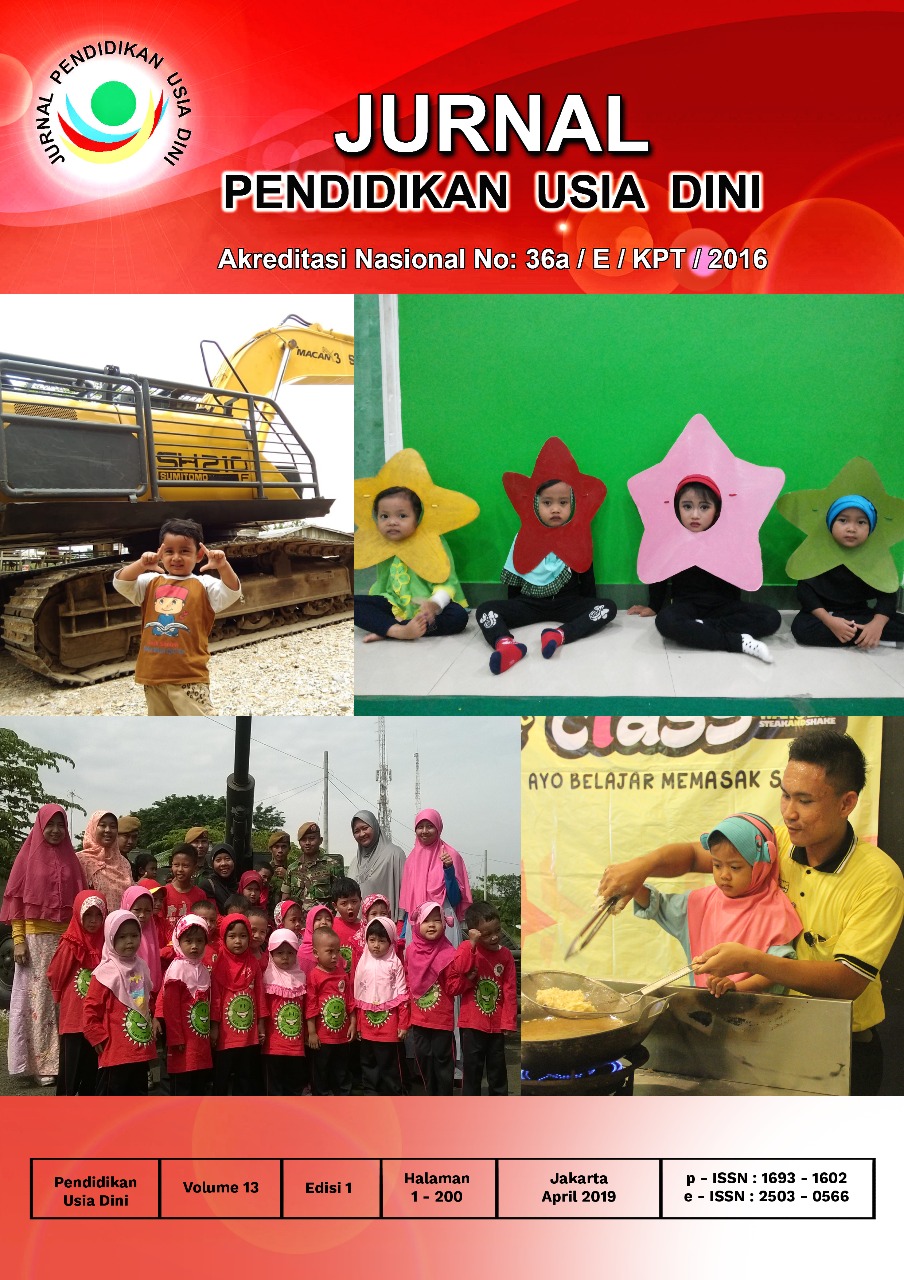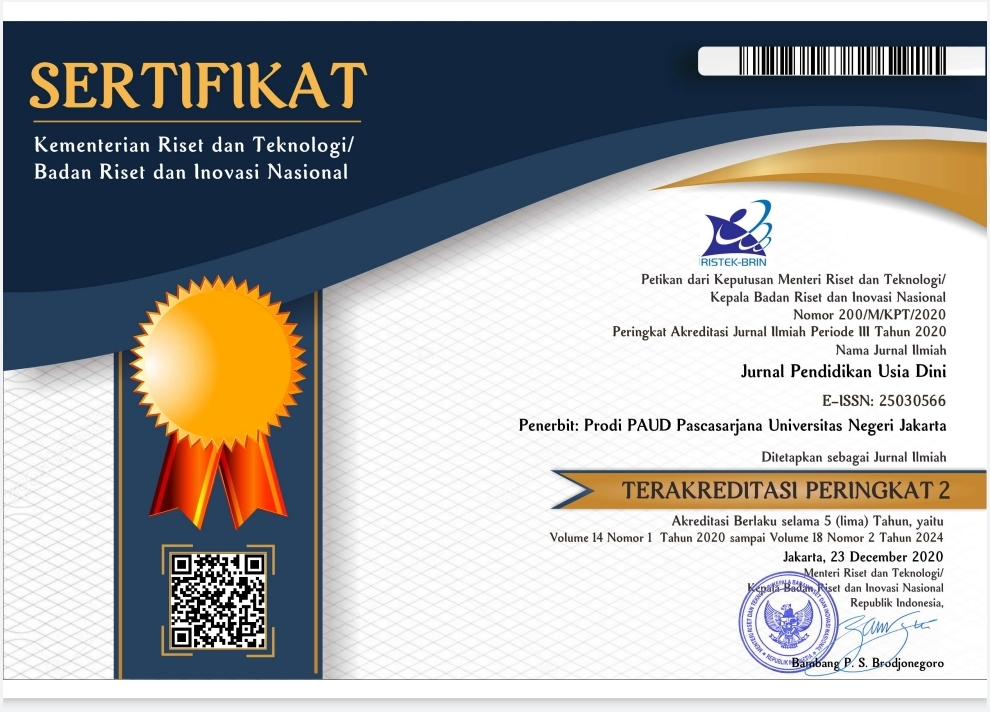Development of Activity-Based Science Learning Models with Inquiry Approaches
DOI:
https://doi.org/10.21009/10.21009/JPUD.131.07Abstract
This study aims to develop an activity-based science learning model with an inquiry learning approach for early childhood that can be used to increase the sense of curiosity and sci-entific thinking in children aged 5-6 years. This study was conducted with research and de-velopment / R & D research methods. Data was collected through interviews, observations, questionnaires, pre-test and post-test for children. Data analysis using paired t-test. The re-sults showed that children were interested and enthusiastic in the learning process by using a science-based learning model with the inquiry approach, Sig. (2-tailed) showing results of 0.000, so the value of 0.000 <0.05 was different from before and after the use of learning models . Results show children can understand the material, more confident and has initiative to find answers for the teacher's questions about science, the child's curiosity increases to ex-amine the information provided by the teacher, the child's understanding of work processes and procedures from science learning with the inquiry approach getting bet-ter. It was con-cluded that an activity-based science learning model with an inquiry approach for children aged 5-6 years used an activity model with an inquiry learning approach based on children's interests and children's needs so that children's curiosity would emerge and continue to be optimally stimulated.
Keywords: Inquiry approach, Learning model, Science Learning
References
Abdi, A. (2014). The Effect of Inquiry-based Learning Method on Students’ Academic Achievement in Science Course. Universal Journal of Educational Research, 2(1), 37–41. https://doi.org/10.13189/ujer.2014.020104
Anderson, R. D. (2002). Reforming science teaching: What research says about inquiry. Journal of Science Teacher Education, 13(1), 11–12.
Bell, R. L., Smetana, L., & Binns, I. (2005). Simplifying inquiry instruction: Assessing the inquiry level of classroom activities. The Science Teacher, 72(7), 30–33.
Borowske, K. (2005). Curiosity and Motivation-to-Learn (hal. 346–350).
Bransford, J. D., Brown, A. L., & Cocking, R. R. (2000). How people learn: Brain, mind, experience, and school. Washington D.C.: National Academy Press.
Buday, S. K., Stake, J. E., & Peterson, Z. D. (2012). Gender and The Choice of a Science Career: The Impact of Social Support and Possible Selves. Sex Roles. Diambil dari https://doi.org/10.1007/s11199-011-0015-4
Bustamance, S. A., White, J. L., & Grienfield, B. daryl. (2018). Approaches to learning and science education in Head Start: Examining bidirectionality. Early Childhood Science Quarterly.
Caballero Garcia, P. A., & Diaz Rana, P. (2018). Inquiry-Based Learning: an Innovative Proposal for Early C
hildhood Education. Journal of Learning Styles, 11(22), 50–81.
Cridge, B. J., & Cridhe, A. G. (2011). Evaluating How Universities Engage School Student with The Science: a
Model Based on Analysis of The Literature. Australian University Review.
Darmadi. (2017). Pengembangan Model dan Metode Pembelajaran dalam Dinamika Belajar Siswa. Yogyakarta: Deepublish.
Doǧru, M., & Şeker, F. (2012). The effect of science activities on concept acquisition of age 5-6 children groups. Kuram ve Uygulamada Egitim Bilimleri, 12(SUPPL. 4), 3011–3024.
Duran, M., & Dökme, I. (2016). The effect of the inquiry-based learning approach on student’s critical-thinking skills. Eurasia Journal of Mathematics, Science and Technology Education, 12(12), 2887–2908. https://doi.org/10.12973/eurasia.2016.02311a
Falloon, G. (2019). Using simulations to teach young students science concepts: An Experiential Learning theoretical analysis. Computers & Education, 135(March), 138–159. https://doi.org/10.1016/j.compedu.2019.03.001
Gerli Silm, Tiitsaar, K., Pedaste, M., Zacharia, Z. C., & Papaevripidou, M. (2015). Teachers’ Readiness to Use Inquiry-based Learning: An Investigation of Teachers’ Sense of Efficacy and Attitudes toward Inquiry-based Learning. International Council of Association for Science Eduacation, 28(4), 315–325.
Ginsburg, H. P., & Golbeck, S. (2004). Thoughts on the future of research on mathematics and science learning and education. Early Childhood Research Quarterly, 19(1), 190–200.
Gross, C. M. (2012). Science concepts young children learn through water play. Dimensions of Early Childhood, 40(2), 3–11. Diambil dari http://www.proxy.its.virginia.edu/login?url=http://search.ebscohost.com/login.aspx?direct=true&db=ehh&AN=78303868&site=ehost-live&scope=site
Guo, Y., Piasta, S. B., & Bowles, R. P. (2015). Exploring Preschool Children’s Science Content Knowledge. Early Education and Development, 26(1), 125–146. https://doi.org/10.1080/10409289.2015.968240
Halim, L., Abd Rahman, N., Zamri, R., & Mohtar, L. (2018). The roles of parents in cultivating children’s interest towards science learning and careers. Kasetsart Journal of Social Sciences, 39(2), 190–196. https://doi.org/10.1016/j.kjss.2017.05.001
Jirout, J. J. (2011). Curiosity and the Development of Question Generation Skills, (1994), 27–30.
Justice, L. M., & Kaderavek, J. (2004). Embedded-explicit emergent literacy I: Background and description of approach. Language, Speech, and Hearing Services in Schools, 35, 201–211.
Lind, K. K. (1998). Science in Early Childhood: Developing and Acquring Fundamental Concepts and Skills. Retrieved from ERIC (ED418777), 85. Diambil dari http://files.eric.ed.gov/fulltext/ED418777.pdf
Lind, K. K. (2005). Exploring science in early childhood. (4 ed.). New York: Thomson Delmar Learning.
Lindholm, M. (2018). Promoting Curiosity ? Possibilities and Pitfalls in Science Education, (1), 987–1002.
Lu, S., & Liu, Y. (2017). Integrating augmented reality technology to enhance children ’ s learning in marine education, 4622(November), 525–541. https://doi.org/10.1080/13504622.2014.911247
Lukas, M. (2015). Parental Involvement of Occupational Education for Their Children. International
Multidicilinary Scientific Cocerence on Social Science and Arts. Maltese, A. V, & Tai, R. H. (2011). Pipeline Persistence; Examining The Association of Educational with Earn Degrees i STEM Among US Students. Science Education.
Nugent, G., Barker, B., Welsch, G., Grandgenett, N., Wu, C., & Nelson, C. (2015). A Model of Factors Contributing to STEM Learning and Career Orientation. International Journal of Science Education.
Pluck, G., & Johnson, H. L. (2011). Stimulating curiosity to enhance learning.
Reiser, B. J. (2004). Scaffolding complex learning: The mechanisms of structuring and problematizing student work. Journal of the Learning Sciences, 13(3), 273–304.
Sackes, M., Trundle, K. C., & Flevares, L. M. (2009). Using children’s literature to teach standard-based science concepts in early years. Early Childhood Education Journal, 36(5), 415–422. https://doi.org/10.1007/s10643-009-0304-5
Walin, H., & Grady, S. O. (2016). Curiosity and Its Influence on Children ’ s Memory, 872–876.
Wang, F., Kinzie, M. B., McGuire, P., & Pan, E. (2010). Applying technology to inquiry-based learning in early childhood education. Early Childhood Education Journal, 37(5), 381–389. https://doi.org/10.1007/s10643-009-0364-6
Wu, S. C., & Lin, F. L. (2016). Inquiry-based mathematics curriculum design for young children-teaching experiment and reflection. Eurasia Journal of Mathematics, Science and Technology Education, 12(4), 843–860. https://doi.org/10.12973/eurasia.2016.1233a
Yahya, A., & Ismail, N. (2011). Factor in Choosing Courses and Learning Problems in Influencing The Academic Achievment of Student`s Technical Courses in Three Secondary School in The State of Negei Sembilan. Journal of Technical, Vocational & Eginereing Education.
Youngquist, J., & Pataray-Ching, J. (2004). Revisiting ‘“play”’: Analyzing and articulating acts of inquiry. Early Childhood Education Journal, 31(3), 171–178.
Downloads
Published
How to Cite
Issue
Section
License
JURNAL PENDIDIKAN USIA DINI work is licensed under a Creative Commons Attribution 4.0 International License. (http://creativecommons.org/licenses/by/4.0/)





